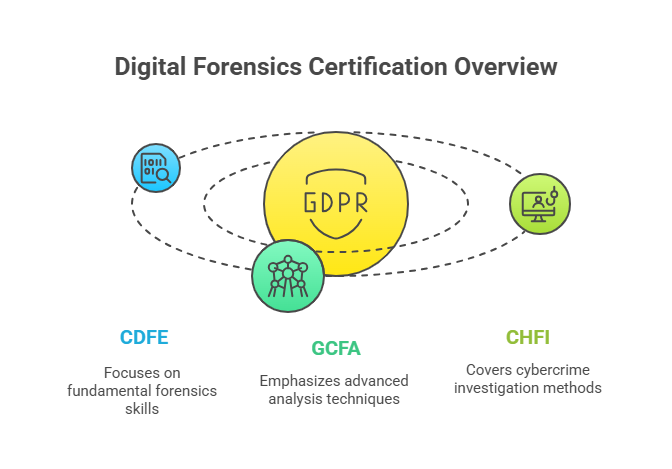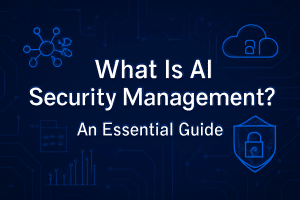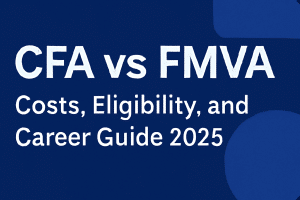The world has gone digital, and with it, the demand for skilled professionals capable of retrieving and analyzing digital evidence has skyrocketed. Digital forensics has emerged as a crucial part of cybersecurity, law enforcement, and legal investigations. If you’re considering stepping into this exciting and rewarding field, you’re likely curious about one thing: digital forensics salary.
This blog will walk you through the earning potential in digital forensics, explain the key factors that affect your salary, and share valuable career advice to help you grow in your career ladder in this rapidly evolving field.
Why Digital Forensics? A Career with Growing Opportunities
The surge in cybercrime has amplified the need for digital forensics professionals. From law enforcement agencies to private companies, organizations everywhere need experts who can recover and analyze digital evidence from digital devices like computers, smartphones, and mobile devices.
Whether it’s an insider threat or a cyber-attack, digital forensics professionals play a vital role in analyzing data security, recovering sensitive files, and providing key insights during investigations to investigate cybercrimes.
With the increasing reliance on technology and the constant threat of cybercrime, the demand for forensic computer analyst roles and digital forensics investigator positions continues to rise, leading to competitive salaries .
Digital Forensics Careers in High Demand
Some of the most in-demand roles in this field include:
- Forensic Computer Analyst: Specializes in data recovery and detailed forensic analysis using digital forensic tools.
- Digital Forensics Analyst: Focuses on collecting, examining, and reporting on digital forensic investigations.
- Digital Forensics Investigator: Leads cases involving cybercrimes and collaborates with legal teams.
- Incident Responder: Handles urgent cyber incidents like data breaches, applying malware analysis and remediation.
Digital Forensics Certifications: Syllabus & Skills You’ll Learn
Many employers prefer or require digital forensics certifications for career advancement. Here are some common certifications along with the key topics covered:
Certified Digital Forensics Examiner (CDFE)
This certification validates core digital forensic skills and prepares candidates for a variety of forensic roles.
Exam Topics:
- Digital Forensics Fundamentals
- File Systems (FAT, NTFS, ext3/4)
- Operating Systems Forensics (Windows, Linux, macOS)
- Memory Forensics & Analysis
- Email and Browser Forensics
- Network Forensics & Incident Response
- Mobile Devices and Cloud Forensics
- Data Acquisition & Imaging Techniques
- Evidence Handling & Chain of Custody
- Report Writing & Courtroom Presentation
GIAC Certified Forensic Analyst (GCFA)
Aimed at professionals dealing with advanced threats and complex investigations.
Exam Topics:
- Advanced Memory and Malware Analysis
- Timeline and File System Analysis
- Registry & Log Analysis
- Advanced Network Traffic Analysis
- Anti-Forensics and Data Obfuscation Techniques
- Incident Investigation Methodologies
Computer Hacking Forensic Investigator (CHFI)
This certification focuses on digital forensic investigations involving cybercrimes and hacking incidents.
Exam Topics:
- Digital Evidence Collection & Preservation
- Cybercrime Scene Procedures
- Password Cracking & Data Decryption
- Email, Web, and Database Forensics
- Steganography Detection
- Cloud and Mobile Forensics
- Advanced Data Recovery Techniques

Why Pursue These Certifications?
These certifications not only boost your technical knowledge but also increase your digital forensics salary significantly. Employers often seek certified professionals for roles involving:
- Malware analysis
- Penetration testing
- Cloud forensics
- Legal expert testimony
With the growing complexity of cyber threats, having formal training and certifications gives you an edge in securing higher salary roles and senior level positions.
What’s the Average Digital Forensics Salary in 2025?
According to the latest reports, the national average salary for a digital forensics analyst in the United States is approximately $74,125 per year. However, depending on your experience, certifications, and location, salaries can vary widely.
Here’s a breakdown of the average salary range for digital forensics roles:
| Experience Level | Average Annual Salary |
|---|---|
| Entry-Level (0-2 years) | $50,000 – $65,000 |
| Mid-Level (3-5 years) | $70,000 – $90,000 |
| Senior Level (5+ years) | $90,000 – $130,000+ |
Digital Forensics Salary by Location (U.S.)
| City | Average Salary |
|---|---|
| Berkeley, CA | $96,567 |
| Washington, DC | $83,012 |
| Brooklyn, NY | $81,623 |
| Los Angeles, CA | $79,373 |
| Chicago, IL | $72,123 |
Factors That Impact Your Digital Forensics Salary
Many variables can affect your digital forensics salary, including hands on experience whether you’re just starting out as a digital forensics analyst or already established as a forensic computer analyst. Let’s take a closer look at the most influential factors:
1. Education
Your educational background plays a huge role in determining your salary in the digital forensics career. Most entry level positions require at least an undergraduate degree, specifically bachelor’s degree in fields such as computer science, forensic science, cybersecurity, or information technology. A strong foundation in areas like operating systems, network security, and programming is critical for success.
However, advancing your education can significantly improve your earning potential. Professionals with a master’s degree or graduate degree in digital forensics, malware analysis, or incident response tend to command higher salaries, especially in senior level positions. Many degree programs also offer specialized coursework in:
- Cloud forensics
- Mobile forensics
- Network forensics
- Advanced data recovery and encryption methods
- Cyber law and legal procedures
Pursuing an advanced degree not only provides a deeper understanding of complex technical topics but also opens doors to leadership roles in both private companies and law enforcement agencies.
See how digital forensics fits into the cybersecurity path.
2. Certifications
Certifications are a fast-track way to boost your digital forensics salary and strengthen your resume. Recognized digital forensics certifications demonstrate your technical skills and show employers that you’re ready to handle specialized skills, such as analyzing data from digital devices or performing digital forensics investigations.
Here are some valuable certifications to consider:
- Certified Digital Forensics Examiner (CDFE) – Focuses on essential forensic analysis, evidence handling, and tool proficiency.
- Certified Ethical Hacker (CEH) – Emphasizes ethical hacking and penetration testing techniques.
- GIAC Certified Forensic Analyst (GCFA) – Covers advanced malware analysis, threat hunting, and incident response.
- Computer Hacking Forensic Investigator (CHFI) – Focuses on recovering evidence and understanding cyberattack methodologies.
Each certification can potentially raise your annual salary by $5,000 to $20,000, depending on the job role, certification level, and market demand. Employers also value certifications because they demonstrate both practical experience and theoretical expertise.
3. Experience
Experience remains one of the most critical salary drivers in digital forensics. Starting as a digital forensics analyst or forensic computer analyst, you’ll likely begin by assisting with investigations and using common digital forensic tools like EnCase, FTK, or Autopsy.
As you gain experience in real world situations, such as cybercrime cases, fraud investigations, ransomware attacks, or crime scene digital evidence collection, you can expect higher salary offers and promotions. Many professionals grow into roles involving:
- Malware analysis
- Mobile devices and cloud investigations
- Leading incident response teams
- Mentoring junior analysts
Experience also helps you develop critical soft skills like critical thinking, verbal communication skills, and complex problem-solving, all essential for leadership positions and court testimony.
4. Industry
Where you work can significantly influence your salary. Private companies, including tech giants, financial firms, healthcare organizations, and cybersecurity consultancies, often offer higher salaries compared to government roles. These industries require advanced security measures and frequently hire experts for roles in:
- Cyber incident management
- Data loss prevention
- Compliance audits
- Advanced threat hunting
On the other hand, working with law enforcement agencies or the military provides additional benefits such as job stability, pensions, and opportunities for career-long specialized training. While some public-sector salaries may start lower than those in the private sector, they often include excellent job security and growth potential.
5. Location
Your geographical location plays a crucial role in determining your digital forensics salary. Salaries tend to be higher in large cities or regions with a high concentration of tech companies and information security analysts, as well as cybersecurity firms.
For example, gaining proficiency in various operating systems can significantly impact your digital forensics career.
- In tech hubs like Berkeley, CA, Brooklyn, NY, and Washington, DC, professionals often earn well above the national average salary for this field.
- Regions with fewer tech companies or limited demand for digital forensic services may offer lower salaries but could provide other perks such as a lower cost of living or more flexible work arrangements.
With the rise of remote work, some digital forensics professionals now have the option to work for companies in higher-paying locations while living in more affordable areas, further increasing their effective income.
How to Maximize Your Salary in Digital Forensics?
Gain Practical Experience Early
Participate in internships, co-ops, or volunteer roles with law enforcement agencies or cybersecurity firms. These experiences help you gain practical experience with digital forensic tools and methods like retrieving data from compromised digital devices.
Pursue Certifications
Start with entry-level certs like CompTIA Security+ and gradually pursue advanced ones like:
- Certified Digital Forensics Examiner (CDFE)
- GIAC Certified Forensic Analyst (GCFA)
Certifications improve your job prospects and validate your digital forensic skills.
Develop Key Skills Beyond Tech
In addition to mastering file systems, operating systems, and computer networks, you should hone your:
- Critical thinking
- Verbal communication skills
- Report writing
- Problem-solving in high-pressure environments
These soft skills are often essential in presenting technical findings to management or in courtrooms.
Keep Learning
Stay ahead by practicing continuous learning:
- Join webinars and workshops
- Study latest trends like malware analysis and mobile forensics
- Network with professionals at conferences
- Engage in penetration testing challenges to broaden your skillset
Career Paths & Salary Ranges in Digital Forensics
| Career Path | Job Description | Salary Range (USD) |
|---|---|---|
| Digital Forensics Analyst | Analyze digital evidence, write reports | $50,000 – $75,000 |
| Forensic Computer Analyst | Recover and examine data from digital devices | $65,000 – $90,000 |
| Incident Responder | Handle cybersecurity incidents and threat analysis | $70,000 – $100,000 |
| Digital Forensics Investigator | Lead complex investigations involving digital evidence | $80,000 – $120,000 |
| Digital Forensics Manager | Manage teams, budgets, and strategy for investigations | $90,000 – $130,000+ |
Is a Digital Forensics Career Worth It?
Absolutely! Whether you start as an entry level position or advance to senior level positions, obtaining a master’s degree can enhance your digital forensics career, which offers steady growth, intellectual challenges, and strong earning potential.
With a blend of technical skills, digital forensic knowledge, and practical expertise, you can thrive in this fascinating field.
Ready to Accelerate Your Digital Forensics Career?
Success in this field requires hard work, persistence, and proper resources. If you’re looking to fast-track your certification journey, Cert Empire, as the best dumps website, helps you confidently prepare for your next certification exam.
Frequently Asked Questions (FAQs)
What is the average starting salary for digital forensics?
The median salary for an entry level role in digital forensics ranges from $50,000 to $65,000 per year.
Do I need a degree for a digital forensics career?
Most employers require at least a bachelor’s degree in computer science, forensic science, or related fields.
Which certifications are best for digital forensics professionals?
Popular options include: Certified Digital Forensics Examiner (CDFE), GIAC Certified Forensic Analyst (GCFA) and CompTIA Security+.
Can certifications boost my digital forensics salary?
Yes! Certifications can increase your digital forensics salary by validating your skills and boosting your value to employers.
Is digital forensics a good career choice?
Yes, it’s an exciting and rewarding field with high demand, especially for those skilled in malware analysis, incident response, and data recovery.
Last Updated on by Team CE



























